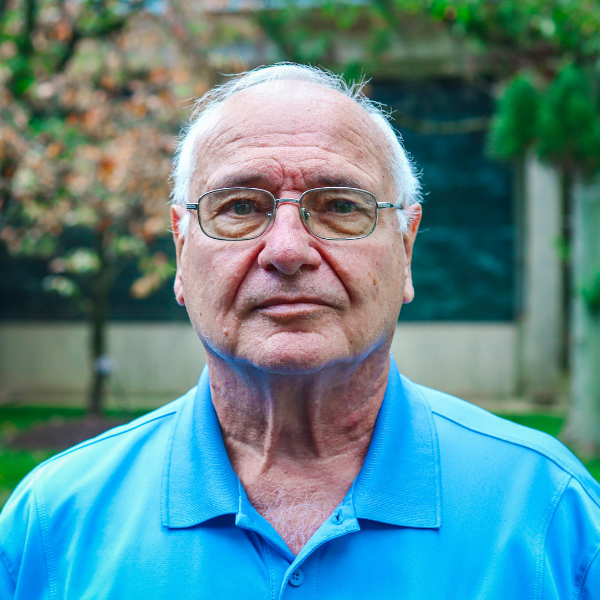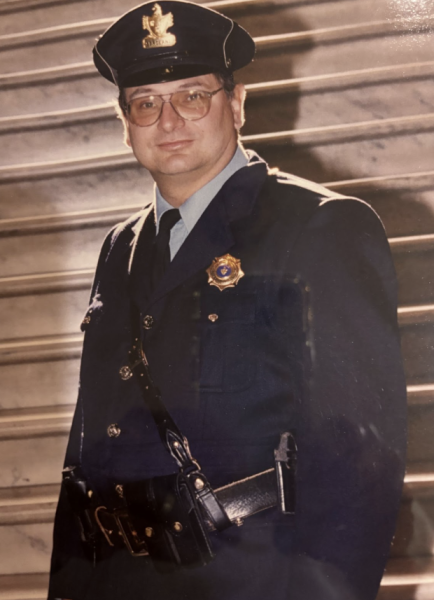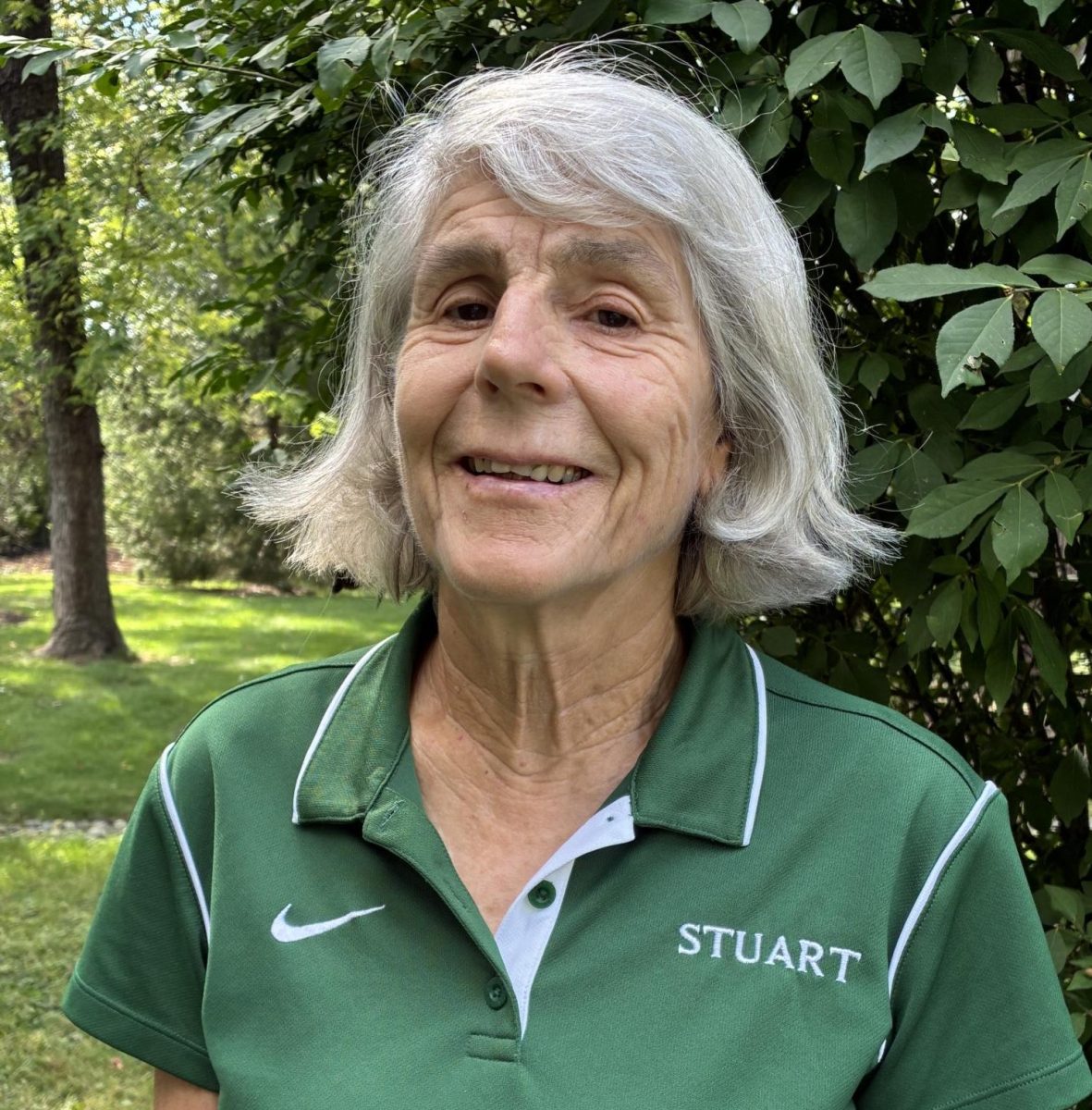
Tom Tucker is Stuart Country Day School’s campus safety officer and has been a certified Human of the Heart for the past twelve years, keeping our campus and community running smoothly. He works part time from 2:30-6:30 every day, monitoring dismissal traffic and manning the front desk to assist those in need. Though he’s had many careers in security, the energetic student body and giant decorative boulders of Stuart hold a special place in his heart.
Tucker found his way to Stuart in 2013 at the recommendation of an old colleague from Rider University. Before that, Tucker had been employed by Rider since 2004. He was no stranger to the campus, having gotten his bachelor’s degree in public administration and sociology from the very same school. As part of the staff, he described patrolling to be “nintey-percent free time”, as the student body was mostly well-behaved, giving him time build community. That said, not everyone is themselves when the weekend rolls around. If a party was being hosted, security was informed and put on watch. Tucker stressed the importance of having a safety unit during these nights, recalling the passing of a Rider student due to alcohol poisoning at a fraternity party. Thankfully, it was an isolated case, but as a security officer, he still faced high offense matters such as sexual assault, burglary, physical assault, and even arson. When asked how the faculty played into this, Tucker shrugged most of them off as professionals, but he alluded to a few unnamed offenses. If a crime was indeed committed, security didn’t have the power to make an arrest, and for that reason, the Lawrence Township police would often join them during night shifts near the end of the week to monitor parties and general campus behavior. Tucker recalls a shoot out that happened before his time at Rider, a show of just how heated college campuses can get, even if not as intense as his previous job of an on-call police officer.
Officer Tucker was employed at the Trenton Police Station from 1974 to 2004, working his way from foot cop to lieutenant. When asked to describe the nature of the job, his passion was evident. He had fond memories of handling the constant work load and enjoyed how every day was different, never knowing what kind of call he was going to get. He mentioned a report that he and his partner once got of a supposed burglary. When they arrived on the scene, two neighbors of the crime scene ran out screaming: “They’re dead, they’re dead!” What was originally a break-in had become a homicide of the burglary victims. The job was hard, he notes, especially when handling cases like this day in and day out. Even so, he was well-prepared and had a strong motivation for public safety, never tiring from the case-to-case lifestyle.

Earning the title of Lieutenant was no small feat. When asked for his advice to anyone with ambitions to climb the ladder, his response had one conclusion: study. For the exam part of the assessment process, officers have to prepare for around two years, and if they fail, must wait another three years to retake it. He emphasized the importance of a good work ethic, recalling the endless hours of studying that got him from officer to sergeant, and eventually, lieutenant. The promotion from officer to sergeant was available to everyone with a basic number of years on the force, so he was up against hundreds of competitors. Each aspirant would take the written exam, have an interview, then be put on a list for consideration. Tucker described the interview as more of an oral exam, as officers would be sat down and asked questions such as: “There has just been a bomb threat to the station. You’re the Sergeant. What are you going to do?” He points out that his educational background, including his bachelor’s degree from Rider as well as a masters degree from City University of New York in international criminal justice, gave him an edge against the competition when being picked off the list. The process of sergeant to lieutenant was similar, only pulled from a smaller pool, which meant that the competition was of higher qualification. He laughed bitterly when looking back at all the midnight shifts he had to work while climbing the ranks. Some officers loved it, he noted, but he was not one of them. He was a high-crime type of guy, which wasn’t on the midnight job description. He would get off around eight-o-clock in the morning, and it was difficult to sleep during the day while having a family. However, his daughter must have admired her father’s hard work, as she took after him and became a corporal of the Princeton University Police Department. She, however, gets to make on-campus arrests. A small highlight to the late nights was Pat’s Diner, Tucker recalled, which was a well-known spot in Trenton and one of the only places open when his shift ended.
Having a lifetime of public service under this belt, it is evident that Tom Tucker is a man of the community. This passion bloomed during his initial years at the station when worked as a foot cop, part of a new federal mandate of the time where officers were assigned to an area of Trenton and put on patrol. He enjoyed this opportunity to build relationships with the people he was serving while having eyes on the ground. The citizens of Trenton were welcoming of the mandate, ready to help the police by being witnesses or reporters of suspicious or dangerous conduct. Additionally, Tucker mentioned that criminal offenders were often agreeable with the law when faced with police. As he put it, they “knew the rules” and would comply if treated with respect.
As a security officer at Rider and now Stuart, he discussed the difference in offenses between age groups. For example, Rider is full of college kids who, at times, committed crimes punishable by law. At Stuart, there is not a lot of arrest-worthy action. Though, as a police officer, he dealt with all different ages. He talked about the gangs he encountered during his time at Trenton Police Station, often composed of youth. Peer pressure is a dangerous thing, he stressed, as there were initiations for gangs that could go as far as shooting a cop. However, in modern Trenton, there are monitors on a multitude of telephone poles that alert the station to audial gunshots, resulting in a great deal of non-injury firearm situations.
When asked about the switch from policing to campus security, Tucker described it as “night and day”, a complete one-eighty. Instead of call-to-call, high crime cases, there is a lot more time to interact with the community, both sides of security which he enjoys. As an ex-midnight officer who faced homicide cases, it would be fair to say that the relaxed environment of Stuart, alongside Rider, hold up the sun part of his statement.
As Students of the Heart, it is only right that we should inspire such an environment. Tom Tucker has long been a servant of public safety, and we are grateful to have his dedicated work ethic on our campus. If you are a part of the Stuart community like me, he leaves us with this advice: don’t park in the fire lane by the gym during pick up, work hard, and continue to respect each other.























